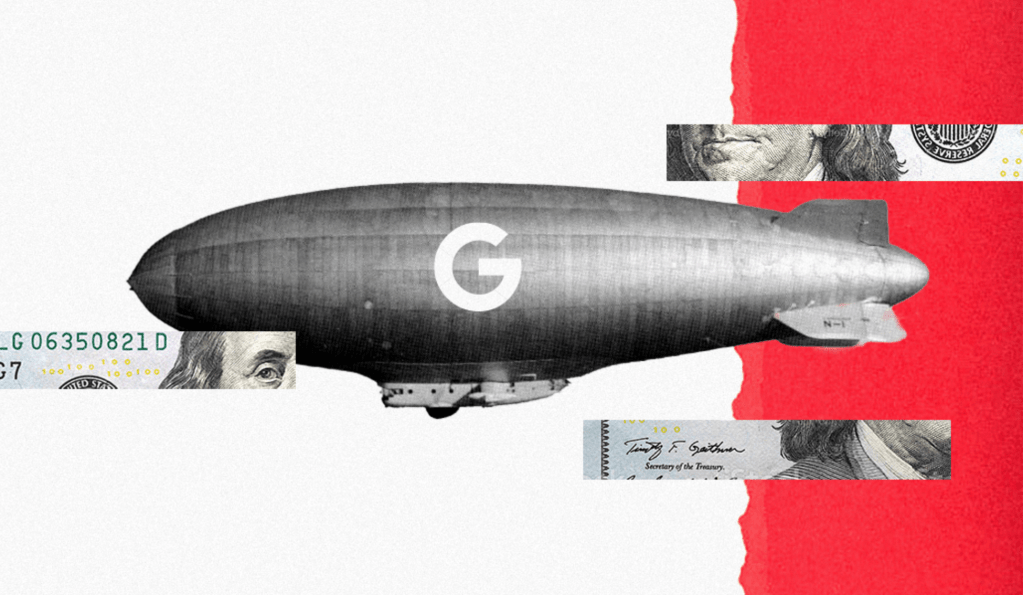Secure your place at the Digiday Media Buying Summit in Nashville, March 2-4
Marketers weigh the cons of working with Google Ad Manager amid Justice Department’s new lawsuit

It might be difficult for advertisers to turn their backs on Google completely but it’s getting a lot easier for them to look away these days.
Antitrust challenges from the U.S. Department of Justice tend to have that sort of effect — especially when there’s a bigger than usual chance that this one could actually subvert Google’s influence over ad dollars.
It’s Google’s most serious antitrust challenge to date. Not only is it anchored to a real harm — the fact that Google’s ads business has foisted a heavy tax on struggling digital publishers — it also outlines how this behavior has hurt users.
The latter point harks back to Sections 1 and 2 of The Sherman Act, articles the DOJ along with eight Attorneys General filed in the U.S. District Court for the Eastern District of Virginia in a 139-page lawsuit last week.
Here’s the short version: Google’s sell-side tools are the target. The DoJ is demanding divestiture of Google’s sell-side advertising assets, or the Google Ad Manager suite, including both Google’s publisher ad server (DFP) and its ad exchange (Adx).
The lawsuit doesn’t, however, call for the same to happen to Google’s buy-side ads business, which would cover paid search, YouTube, as well as its demand-side platform Display & Video 360.
Unsurprisingly, marketers aren’t saying much. They rarely do on matters this sensitive around Google. Not because they don’t necessarily have an opinion.
Chances are they will, given they’ve probably seen enough over the years to have at least a basic understanding of how Google edged out its rivals to build the world’s dominant ad business. It’s just that whatever opinion they had about Google’s practices was long overridden by the realities of being a marketer. Indeed, the very mechanism that makes Google so appealing to marketers — its so-called network effects — happens to be considered monopoly evidence by antitrust authorities.
None of this should take away from the underlying issue here: irrespective of what side of Google’s business is in the crosshairs, it’s difficult to think about spending money on a platform that increasingly looks like it could get broken up. Let alone one that is (or has been) the subject of other investigations into whether it abused its power. Even if there are many marketers who have made peace with the more domineering aspects of Google’s business, the DoJ’s lawsuit will have given some of them pause.
“We don’t predict significant changes to how Google operates or for there to be a material impact to users for multiple years, as we expect Google to fight this suit,” said Goodway Group CEO Jay Friedman. “In the meantime, marketers need to weigh the combination of the switching cost plus the delay in learning other platforms against the value Google is bringing them today.”
What this period of reflection actually amounts to is anyone’s guess. Especially since any resolution could be a long time coming: the likelihood of any action from this lawsuit could take years, as well as depend on the priorities of a given administration. And that’s before the costs of walking away from Google are factored into things. Lawsuits of this complexity are always more a slow burn than a blaze.
Making the case
Much of the suit is rooted in how Google was able to maintain the 20% revenue share fee it has charged on its ad exchange since 2009. And it paints that against the vast, influential scale Google has across publishers, the ads they sell, and the data that informs it.
“It’s hard to convey to the public why this is important,” said Ana Milicevic, co-founder and principal, Sparrow Advisors, adding that one potential way of demonstrating how Google’s alleged dominance of such ad auctions is to compare it to how Big Tech dominates more tangible marketplaces.
For instance, Google’s control of both the buy- and sell-side of an ad auction is similar to Amazon’s visibility of both buyer and seller activity on its marketplace for physical goods. The fact that Amazon has this ubiquitous visibility, and then introduced its own Basics line in certain categories to the detriment of third-party merchants is one parallel.
“You need to demonstrate the loss of dollars by the free press,” Milicevic added.
The muted reaction from marketers to the lawsuit starts to make sense. It’s a moment to really understand what it does and doesn’t mean. That’s what the four agency execs who spoke to Digiday for this article said they had spent the intervening days since the announcement doing — and there’s a lot for them to unpick.
Among them, is whether this lawsuit will change everything and nothing about the way Google sells ads.
Why? Let’s say the suit resolves in not forcing advertisers to use Google’s bidding tech to buy from its online marketplace. Does that really get to the heart of the matter if the real impact is that Google pulls even more money away from publishers into its own owned and operated properties?
Advertisers weigh up the odds
“This move by the DOJ has been a long time coming and creates an industry imperative for independent ad tech, which we are seeing advertisers embrace,” said Bill Wise, CEO, Mediaocean in a statement too Digiday.
And, with time, advertisers have begun to consider the true cost-benefit of working with Google and whether it makes sense to have so much of their money running through its tech. In some cases, they’ve even acted on those concerns.
For example, in 2018, British Gas ditched the search giant’s ad server in favor of an independent one, and since then the power company hasn’t regretted its decision. Perhaps unsurprisingly, other advertisers have explored similar moves in the intervening years.
“We’re getting more holding groups and independent agencies come to us looking for a secondary alternative to the Google ad tech stack because clients don’t want to put all their eggs in one basket,” said the managing director of an ad tech firm on condition of anonymity that declined to go on the record over concerns of breaching confidentiality terms with clients.
“There’s enough lawsuits, investigations and analysis in the press out there on both sides of the Atlantic to make it hard to ignore the outstanding issues with the way Google runs its ads business.”
True as this may be, don’t expect this lawsuit to breathe new life into the “breaking up with Google” narrative — at least not yet. Sure, those marketers who have already done it — or are doing it — will feel vindicated by what the DOJ is trying to do. But for everyone else it’s more a case of wait and see.
“This lawsuit comes after a string of growing concerns and increasingly substantial fines for opaque practices, not just in the U.S., but the U.K. and Europe as well,” said Anders Pilgaard Andersen, the general counsel of legal, Adform.
“If the DOJ is successful in its litigation, the move the DOJ is demanding will unlock a renewed wave of innovation and competition in the advertising industry and has the potential to be a landmark moment in the move toward re-establishing a fair, open internet.”

Will Google actually benefit?
Aside from the debate over which sector of the media industry would benefit most from any such break-up, some are pondering potential benefits for the Alphabet-owned entity?
Prominent ad tech commentator (and ex-Googler via way of DoubleClick) Ari Paparo told Digiday its ad stack has become an albatross around the neck of the online giant, claiming that it would make it a “leaner, smarter company.”
According to Paparo, CEO Marketecture, deprioritizing its ad tech operations, which yield low margins compared to its core competencies while also drawing fire from various corners, will let Google hone in on future profit-making ventures.
“If they had less conflicts of interest and less worries about regulation and antitrust, they could instead focus on things that they are really good at including search, cloud, and other initiatives,” he concluded.
More in Media

From feeds to streets: How mega influencer Haley Baylee is diversifying beyond platform algorithms
Kalil is partnering with LinkNYC to take her social media content into the real world and the streets of NYC.

‘A brand trip’: How the creator economy showed up at this year’s Super Bowl
Super Bowl 2026 had more on-the-ground brand activations and creator participation than ever, showcasing how it’s become a massive IRL moment for the creator economy.

Media Briefing: Turning scraped content into paid assets — Amazon and Microsoft build AI marketplaces
Amazon plans an AI content marketplace to join Microsoft’s efforts and pay publishers — but it relies on AI com stop scraping for free.








